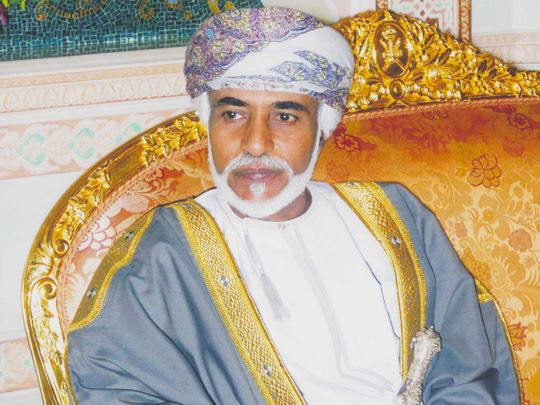
Cairo: The death of Oman’s Sultan Qaboos Bin Saeed on January 11 triggered an outpouring of grief inside his country and beyond. He passed away aged 79 after ruling Oman for nearly 50 years, leaving behind an indelible legacy at home and in the rest of the world.
The late sultan significantly transformed the Arabian Peninsula country in different walks of life, an accomplishment that has earned him the nickname, the founding father of modern-day Oman.
When he took power in 1970, Oman had only three schools, two hospitals and six kilometres of paved roads. Once at the helm, Qaboos embarked on converting Oman from a backwater into a progressive country, by launching a series of ambitious schemes promoting education, healthcare, trade and road links.
Qaboos also established Oman’s first cabinet, government departments and two advisory bodies, including the elected Shura Council representing all the country’s provinces or wilayats.
In 1996, Oman had its constitution. Qaboos also modernised the Omani army.
In 2011, he opened in Muscat the Royal Oman Opera, the first opera house in the Gulf.
Under Qaboos, Oman enjoyed political and economic stability in a turbulent region. He adopted a foreign policy based on good neighbourliness and cordial ties with different countries – a policy dubbed as “a friend of all and a foe of none”. With this policy, Oman has emerged as a trusted mediator.
Qaboos’ Oman helped defuse US-Iran tensions in 2013 and played a major role in reaching a nuclear deal between Tehran and big powers, including the US, two years later.
The sultanate also maintained balanced relations with regional rivals Saudi Arabia and Iran. In 1994, Israel’s then prime minister Yitzhak Rabin visited Oman, the first trip by such a senior Israeli official to an Arab country with no diplomatic links with Tel Aviv. In 2018, Qaboos met Israeli premier Benjamin Netanyahu in Muscat.
'Positive neutrality'
Oman, meanwhile, brokered the release of several Western hostages in neighbouring Yemen and was reportedly a venue for behind-the-scenes talks between Saudis and Yemen’s Iran-allied Al Houthi rebels to end a years-long war.
Based on its self-styled “positive neutrality”, Oman did not take sides in a Saudi-led military campaign against Al Houthis.
The Sultanate also steered clear of an ongoing dispute that erupted in 2017 between Qatar and a Saudi-led Arab quartet.
Qaboos was succeeded by Haitham Bin Tarik, a former culture minister and his cousin.
Upon assuming power, Sultan Haitham pledged to follow Qaboos’ foreign policy of peaceful coexistence and non-interference in other countries’ affairs.
He also promised to build on Qaboos’ legacy of keeping Oman’s development and maintaining friendly ties with all countries.
“We are going ahead on the path to building and development as Sultan Qaboos charted it,” Haitham said in his first address as a sultan on February 23, after the end of 40 days of mourning over Qaboos’ death. He said that Oman will continue to “spread peace”.
He also pledged to revamp the country’s administrative apparatus and economy dented by a fall in oil prices.
In August, Haitham conducted a cabinet reshuffle replacing Oman’s long-serving foreign minister Yusuf Bin Alawi with Badr Bin Hamad.
He also appointed Sultan Al Habsi as finance minister, a post held by late Qaboos.
In a gesture of its support for regional peacemaking, Oman welcomed historic peace treaties that fellow Gulf countries, the UAE and Bahrain, signed in September with Israel.








